Cannes Lions Experience
Student delegate 2022, Teacher's Assistant 2024 :)
I know how lucky I am.
It was the best week ever.
I did more than just drink rose.
I fell in love with creativity here.
I left feeling like I wanted to change the world.
I would love to tell you more about it.
YES




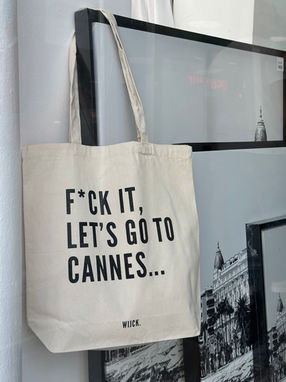

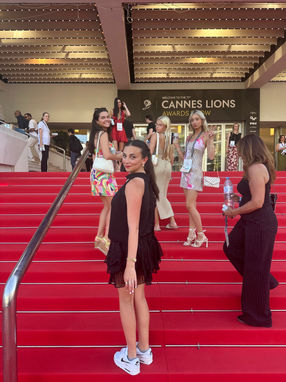


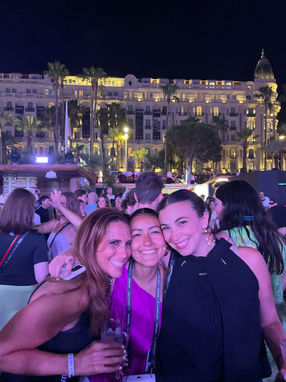
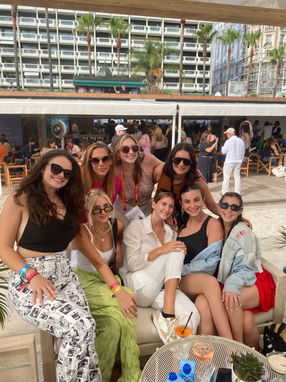
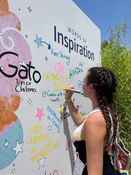
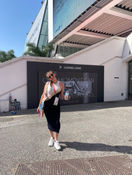

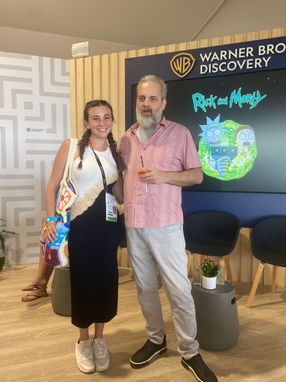
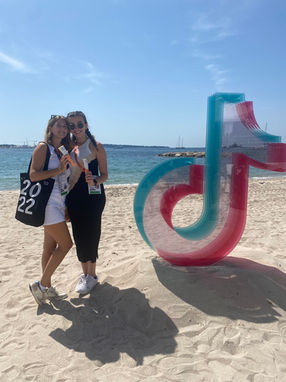
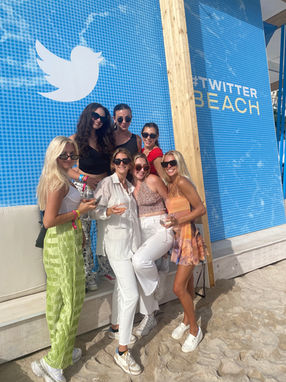



Read about my 2022 experience below
Pepsi x Alma: Yielding Unapologetic Creativity Through Collaborativity
As my first talk, I instantly knew that this week was going to be the best, most inspirational week of my life. Collaborativity should be how this industry works– and this step by step guide on how to do so will be something I incorporate into my work, in hopes of creating something as great as this campaign.
*I ended up working at alma the following summer which was an amazing, full-circle experience.
Hearing how Todd Kaplan (CMO of Pepsi) and Luis Miguel Messianu (alma DBB Chairman) used one powerful insight to create the 'Better With Pepsi' campaign through a concept they called collaborativity was beyond inspiring.
The 5 Principles of Collaborativity:
-
Round 0. Starting with a ton of small nuggets of an idea to then build upon.
-
Brutal Transparency. Lying to anyone will only hurt the work in the end.
-
To Serve and Protect. There is no agenda of agency/client that trumps the idea itself. The focus should be on creating the right execution so everyone is proud of the work.
-
Seek Out Diverse Perspectives. That's how Pepsi came up with this insight and the most effective campaign to date.
-
Get Messy! Roll up your sleeves and build the idea together. Don't look at it as boss/client (that can get toxic), but as partners.
FESTIVAL DAY 1 • FESTIVAL DAY 1
LinkedIn: Back to the Creative Future with Ryan Roslansky (CEO)
Tech is taking over the world and unless the advertising industry is able to help tech communicate their promise and brand values, advertising will be missing out on a massive opportunity for growth.
This was easily one of my favorites and most influential talks of the entire festival. The flow of conversation was perfect–– data, stories, relevant takeaways, and so on. Data from LinkedIn showed that Gen-Z will change jobs when they aren't motivated/inspired and most importantly, there is a global arms race for talent in tech. Every industry wants us advertisers, our creativity, and the recent boom in technical skills for their own.
In the past five years, the advertising industry has lost 5.5% of net talent while the tech industry has grown by 23%. So how do we keep our industry and creativity from declining and being overrun by tech? We embrace the tech industry with B2B marketing.
Roslansky shares that ads create economic value for a company and really do have the power to change the world. The core competitive advantage of most big brands is their creativity and ability to relate to their audience, something that the new tech industry is unfamiliar with. That's where creatives and advertisers come in.
There are tech companies you probably never heard of with a larger market share than Coca-Cola and Pepsi combined. Yep, combined. Despite being so large, Roslansky says you probably never heard of the companies because they market and sell to all of your other favorite big brands. I felt like a lightbulb went off in my head–– I've always dreamed of working in tech as a creative and now there are facts and data supporting why the tech industry could benefit from advertising
FESTIVAL DAY 2 • FESTIVAL DAY 2
MNTN/Maximum Effort: Ryan Reynolds on Next Generation Storytelling
Formality isn't always necessary, especially in today's world when people know the second they see an ad. Anything is always worth a conversation- ask yourself what is really under the bad idea. Lastly, to be good at something, you have to be okay with being really bad at it first.
"Necessity of the mother of all inventions." In the case of Ryan Reynolds, the need for a new approach of not just advertising but rather storytelling is what led to the invention of his agency, MNTN/Maximum Effort.
When looking at typical brand issues, the most prominent is the enormous amounts of red tape before publishing something. A typical campaign takes 9-12 months to develop and produce, meaning by time it's released to the world the campaign is no longer culturally relevant.
Reynolds summed up next-generation storytelling to these four points.
1. Speed. Culture moves fast, and by a brand doing fun and relevant ads they can make themselves part of cultural conversations, not just a commentator on it.
2. Emotion. Any emotion, especially humor, travel virally because it evokes a feeling in people.
3. Product at the front and center of ads. People are smart and know when they're being marketed to, so by giving them authorship of the ad you give them a new sense of control.
4. Navigating the right tone. It's about projecting what you want forward and doing your best not to contribute to the negativity and anxiety in the world.
Hearing the first account of Reynolds's journey through the entertainment industry, taking over 10 years to create Deadpool, the guerilla marketing behind Deadpool, purchasing of his Gin company, and eventual accidental founding of his agency, I was blown away by his knowledge and humility.
FESTIVAL DAY 3 • FESTIVAL DAY 3
The Saatchi & Saatchi New Creators' Showcase
Creativity comes in a plethora of different forms.
From my understanding, this showcase used to be one of the most engaging and popular events at Cannes which is why my professor urged us to go. This year's showcase focused on British creators who are up and coming in the field. I may not have loved every video, but found each one to be unique and highly creative, most definitely having earned their place in this showcase.
FESTIVAL DAY 4 • FESTIVAL DAY 4
Cannes x Microsoft Meet-Up: Josy Paul on Empathy, Emotional Data & Creativity
Using human fundamental truths in advertising helps ensure people can feel connected to your brand message.
"Why can't advertising also be therapy?" Josy Paul was so motivational and inspiring AND I loved that every sentence spoken had an insight or something so profound that I was scribbling it all down in my notebook. I mean, he referred to himself as an antenna and DJ because of the way he receives and communicates emotion–– that says it all about his positive mindset. Paul discussed how he applied the below principles to some of the most impactful work he's directed such as 'Touch the Pickle' and Ebay's 'Things Don't Judge' campaigns which I highly recommend you check out!
Amazingly creative advertising is not just based on human insight but should be based on human confessions. No amount of research can compare to what people feel on the level of their soul.
It's not about the brief, but about the briefing. A great campaign can't be just a transaction between the client and agency. There needs to be conversations and emotional exchanges to find the good the idea is rooted in. It's not about selling, but about buying. You buy something because you want to–– it's already in you. Using human confessions as a campaign insight is the benefit.
Creativity is the return gift of empathy. Empathy makes showing up easier and takes the pressure off of whether or not you are doing something right. Listening to people's emotions and using those are what's impactful. The universal currency is emotion. Everyone can relate to any emotion, after all, we are all only human.
Here's how Josy navigates mining for emotional data. Most importantly, all of the following have to come from a genuine place.
1. Create a safe space. Read comments on videos you love and see people confess something in the comments because they can relate in that safe space.
2. The white room. Brainstorming with no other distractions or biases.
3. Be vulnerable.
4. Build trust.
5. Deep listening.
So, why has emotional data and creativity proven so effective? Because there are so many brands in the world where people are now looking for meaning. Connecting with your audience doesn't always have to prove you are the most creative brand, but just understanding.
FESTIVAL DAY 5 • FESTIVAL DAY 5
